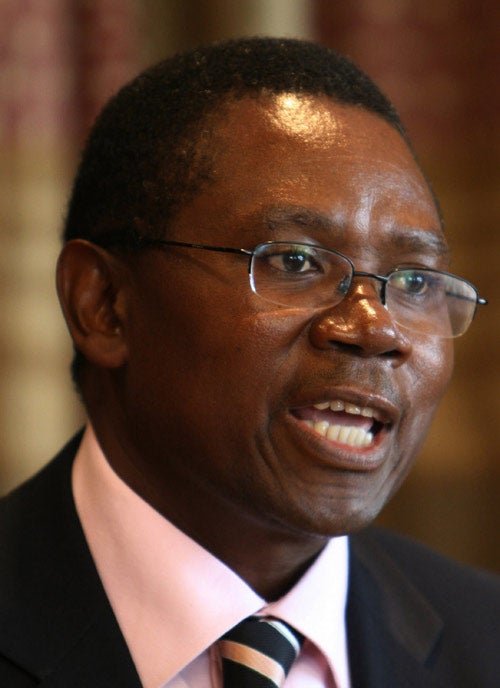Mugabe faces first real challenge as former minister launches bid to take presidency

Your support helps us to tell the story
From reproductive rights to climate change to Big Tech, The Independent is on the ground when the story is developing. Whether it's investigating the financials of Elon Musk's pro-Trump PAC or producing our latest documentary, 'The A Word', which shines a light on the American women fighting for reproductive rights, we know how important it is to parse out the facts from the messaging.
At such a critical moment in US history, we need reporters on the ground. Your donation allows us to keep sending journalists to speak to both sides of the story.
The Independent is trusted by Americans across the entire political spectrum. And unlike many other quality news outlets, we choose not to lock Americans out of our reporting and analysis with paywalls. We believe quality journalism should be available to everyone, paid for by those who can afford it.
Your support makes all the difference.Robert Mugabe is facing the first major internal challenge to his leadership in 20 years after his former finance minister, Simba Makoni, 57, said he would run against the President in next month's elections.
The decision complicates what was looking like an electoral procession for Mr Mugabe after the opposition failed to agree a united front at the weekend, leaving him facing a weak and divided field.
Mr Makoni ended weeks of speculation yesterday by announcing he would stand as an independent against his one-time political mentor. "I share the agony and anguish of all citizens over the extreme hardships we have all endured for nearly 10 years," he told reporters. "I also share the widely held view that these hardships are a result of failure of national leadership."
Mr Makoni said that he and an "overwhelming majority" of Zanu-PF members were disappointed that a congress in December had failed to change the party's leadership. The former minister's strongest backer appears to be Solomon Mujuru, a former general and leading member of the ruling party's politburo. General Mujuru, husband of the vice-president, Joyce Mujuru, has been consistently linked with attempts to topple Mr Mugabe.
The President had summoned Mr Makoni to the State House in Harare last week to confront him over any potential challenge but sources said that the former minister had denied any imminent move.
Mr Makoni could profit from widespread Zanu-PF disillusionment with the 84- year-old leader and opposition supporters enraged by the bickering in the Movement for Democratic Change (MDC). The two factions of the MDC, led by Arthur Mutambara and Morgan Tsvangirai, plan to fight the elections separately.
Tafirei Madiro, a company executive in Harare, was typical of disgruntled opposition supporters in welcoming Mr Makoni's bid. "In fact I was not going to even bother voting for any of those factions," he said. "Neither were many of my friends. But Makoni's emergence has given the nation an alternative viable choice."
Mr Makoni is backed by several influential Zanu officials who wanted new leadership at the party's special congress in December but were thwarted by Mr Mugabe after he railroaded through his nomination without debate. The former minister said he would have wanted to run on a ruling party ticket but found that door shut for him. Party insiders say General Mujuru's support guarantees Mr Makoni a substantial backing from the military which has been the backbone of Mr Mugabe's rule.
"His move opens up this whole electoral game," Eddie Cross, a senior MDC official, said. "He must have major support in Zanu. It seems there was a lot of preparation in all this. It can't be a sudden thing."
Analysts say shortages of food, foreign currency, fuel and the world's highest inflation rate officially pegged at 26,000 per cent present the biggest challenge to Mr Mugabe's rule.
Mr Makoni had left President Mugabe's first post-independence government for four years before leaving to go into business. Mr Mugabe appointed him finance minister in 2000. He resigned two years later over policy differences with the President but remained in Zanu's top decision-making body, the Soviet-style politburo, until he broke ranks yesterday.
He is well-respected internationally and during his spell as finance minister he angered Mr Mugabe by frequently meeting officials of the British and other Western embassies who held Mr Makoni in high esteem.
This was after Mr Mugabe started his campaign to seize farms from white farmers. His bodyguards were said to have compiled a secret dossier of Mr Makoni's visits to the then UK High Commissioner, Peter Longworth.
From Leeds University to the fight for leadership
While Robert Mugabe and his Zanu-PF old guard were fighting their liberation war in the 1970s, Simba Makoni was busy gaining a BSc and PhD in chemistry at Leeds University. At the same time, he was networking and lobbying for Zanu in Europe. At independence in 1980, he was appointed deputy agriculture minister, aged just 30. He later served as minister of energy but quit four years later, resurfacing as head of the Southern Africa Development Community. Nine years as the region's most senior civil servant in Botswana gained him international exposure as world attention focused on ending apartheid in South Africa. In the early 1990s, he ran a state-owned newspaper group in Zimbabwe before being readmitted to the Mugabe inner circle and appointed finance minister in 2000. He pledged tougher fiscal discipline to restore relations with external donors but in 2001 he admitted the economy was in crisis. "I would have to be foolish to deny what is evident to everybody," he said. In 2002 he resigned over a "policy difference" with political colleagues. His call for a devaluation of the Zimbabwe dollar earned him Mr Mugabe's disapproval as an "economic saboteur".
Join our commenting forum
Join thought-provoking conversations, follow other Independent readers and see their replies
Comments